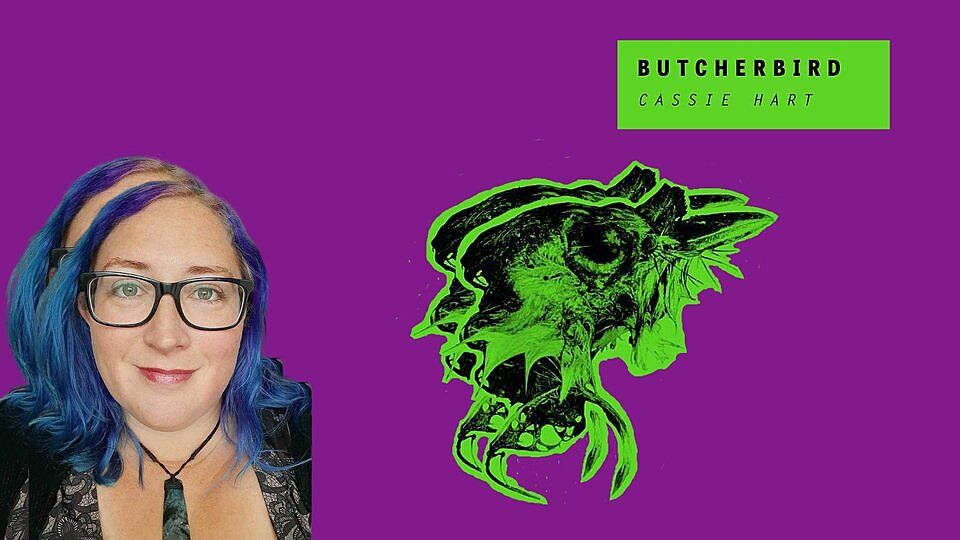The Dark Forces of Aotearoa: A Review of Butcherbird
Tihema Baker finds a rural Taranaki underworld of lore and gore in Cassie Hart’s first traditionally published novel.
CW: Rape and sexual assault
Any speculative writer in Aotearoa knows it’s incredibly hard to get published here. Many of us rely on blogs, journals and anthologies, or pursue self-publishing to get our work out into the world, especially when it comes to speculative novels. That’s why I was so excited to read Butcherbird,by Cassie Hart (Ngāi Tahu). It’s her first traditionally published novel, but by no means her first novel; she’s written over ten books and novellas alongside work in various anthologies, and is a regular finalist in the Sir Julius Vogel Awards. It’s great to see traditional publishing promote the talent of a speculative writer like her.
Butcherbird is a supernatural thriller about Jena, a down-on-her-luck 20-something in a relationship going nowhere, who is forced to come to terms with her dark family secret by the impending death of her ailing grandmother, Rose. Along with her boyfriend Cade – who’s more interested in making a quick buck out of her dying grandmother – she returns to the Taranaki farmhouse she grew up in. There she encounters Will, Rose’s in-home carer, who has his own secrets and reasons for being there, and together they uncover the tragedy of Jena’s past – and the evil that caused it.
This is the kind of book you can curl up with under a blanket on a rainy weekend
This is the kind of book you can curl up with under a blanket on a rainy weekend, with a hot choccy, and just race through. I often found myself reading ‘just one more chapter’ – not because of cheap cliff-hangers but because I, like Jena, desperately wanted to know what exactly the evil hunting her was. The writing is simple yet engaging, making great use of disturbing imagery at just the right moments; the visual comparison of beef mince to a person’s exposed entrails was a particular, stomach-turning highlight. Just enough of these bloody breadcrumbs were scattered throughout to keep me reading on in pursuit of understanding the dark forces at play.
Admittedly, this breadcrumb trail sometimes runs into obstacles that seem to have been placed a little too conveniently. Rose will find any excuse to shut down talk with her granddaughter about the immense danger they’re apparently in, which Will is all too keen to accommodate, and Jena quickly accepts. When the real threat is finally unleashed, though, it’s an exhilarating rush to the novel’s climax.
When the real threat is finally unleashed, it’s an exhilarating rush to the novel’s climax
Aside from this tendency to get in their own way a bit, Jena and Will are both solid protagonists, with different strengths and flaws that play off each other. Compared with Jena, who carries the novel, I was initially a little unconvinced by Will’s backstory and reasons for becoming Rose’s carer. But as the story progressed and I learned more about him, I was more willing to believe why he’d be there. He and Jena are both simply traumatised by the events of their childhoods, which affects them in ways that feel natural. Will is quietly driven by an obsessive need to understand his trauma, while Jena ignores hers by pretending to be content with her rundown apartment and dysfunctional relationship with Cade.
Speaking of which, there is a rape scene that, naturally, is quite disturbing to read. It’s obviously intended to be uncomfortable, and raises questions about sex and consent in established hetero relationships. I did wonder whether such an uncomfortable scene needed further addressing within the text, as it kind of just happens, and the plot quickly moves on. But perhaps this thought means that the scene achieved its desired effect. Either way, I just want to signal to readers that it’s there, and if it makes me uncomfortable, others might feel the same way.
Butcherbird could be the first in a series of novels exploring dark forces in Aotearoa
Butcherbird undeniably feels like a novel of Aotearoa. The writing is grounded in a vernacular that seems familiar. When reading literary Aotearoa fiction, I’m often struck by dialogue that sounds nothing like how people actually talk, but Jena and Will sound like real people. The farmhouse feels like a real place in rural Taranaki, with its murky swamp and ute-driving, stubbie-wearing neighbours, all under the constant watch of the maunga. The magpies that give the book its name are a haunting presence throughout and feel like part of the very landscape itself. There are welcome hints of te ao Māori to be found too: in Will, who seems to break every stereotype for tāne Māori there is, and in the references to Māori ways of interpreting or fighting the supernatural, such as matakite.
That’s probably the lasting impression Butcherbird left me with: that it’s only a glimpse ata whole underworld of lore created by Cassie Hart. With a lot more to Will’s past hinted at and a rich library of Māori mythologies to draw upon, Butcherbird could totally be the first in a series of novels exploring the dark forces that exist in Aotearoa. I’ll certainly be keeping an eye out for more.
Butcherbird is published by Huia
Feature image: Sherry Zhang

